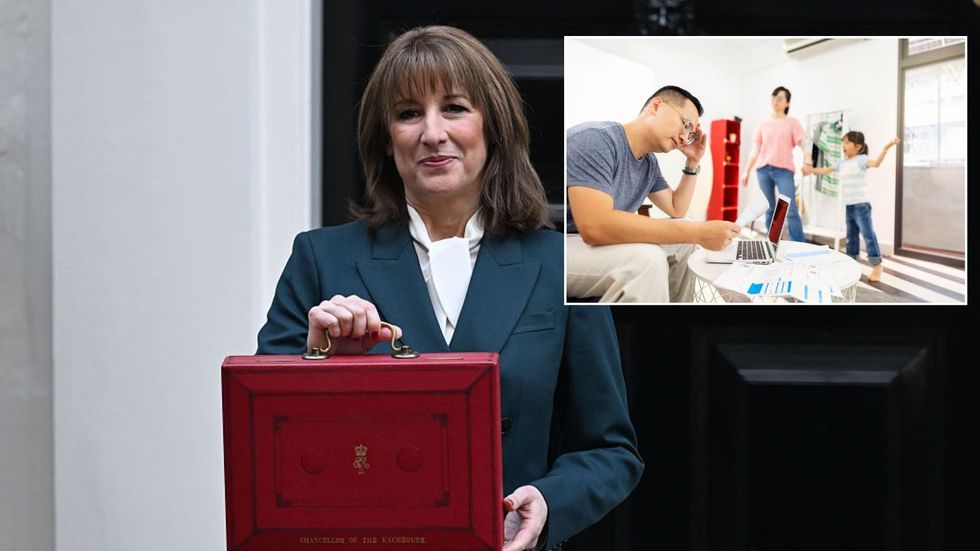'Tax tsunami' warning as millions face hits to savings, pensions and pay - nine ways to avoid it

Patrick Christys shares his opinion on Rachel Reeves' 2025 Budget |
GB News

Experts warn millions face higher bills but say smart planning can blunt the Budget’s impact
Don't Miss
Most Read
Latest
Chancellor Rachel Reeves’ second Budget has been branded a “tax tsunami” after she unveiled £26billion of tax rises that will hit savers, investors and workers.
The measures include frozen income tax thresholds, new limits on salary sacrifice, reduced ISA allowances and higher tax rates on savings, dividends and property.
Laura Suter, AJ Bell’s director of personal finance, said: “While there’s no doubt that tax increases are coming, there are clever ways to mitigate the impact.
"Making smart moves before some of the changes come into effect, while also getting the most out of the tax breaks that remain, will put you on good financial footing to weather the storm.”
TRENDING
Stories
Videos
Your Say
She has provided nine ways to beat the budget
1. Don’t ditch salary sacrifice
From April 2029, National Insurance savings on salary sacrifice for pensions will be capped at £2,000 per year.
Ms Suter warned against cutting contributions, saying: “Despite the NI savings being limited, what you pay in will still be exempt from income tax and workers can still enjoy pension tax relief up to their marginal rate.”
She added that pension contributions can reduce “adjusted net income”, helping workers sidestep higher-rate tax thresholds while boosting retirement funds.
Find further details on this measure here.
2. Beat the frozen allowances
Income tax bands will remain frozen until 2031, drawing more earners into higher tax brackets.
Ms Suter said: “Someone with an adjusted net income of £60,000 or more will start to see child benefit clawed back, while breaching £100,000 means losing the personal allowance.”
She said effective tax rates can reach 62 per cent once National Insurance is included, but pension contributions can help avoid these bands.
Learn more about this policy here.

Chancellor Rachel Reeves’ second Budget has been branded a “tax tsunami” after she unveiled £26billion of tax rises that will hit savers, investors and workers
|GETTY
3. Use the Lifetime ISA while you can
The government has signalled a review of the Lifetime ISA, but the current rules still allow up to £4,000 a year to be paid in with a 25 per cent bonus.
“For anyone saving for their first home, the Lifetime ISA is pretty unbeatable,” Ms Suter said.
Full coverage of the measure is available here.
4. Protect your cash savings from tax
Frozen bands and higher rates of interest mean millions now face tax bills on savings.
From next April, tax rates on cash savings will rise by two percentage points to 22 per cent for basic rate taxpayers, 42 per cent for higher rate and 47 per cent for additional rate.
Ms Suter said: “It’s more important than ever to make sure you’re protecting your cash from tax. Using ISAs and personal savings allowances between couples can help reduce the burden".
More details on this measure here.
LATEST DEVELOPMENTS
 The Lifetime ISA may be reformed soon | GETTY
The Lifetime ISA may be reformed soon | GETTY5. Prepare for the dividend tax squeeze
Dividend tax rates will rise again next April, with the basic rate increasing to 10.75 per cent and the higher rate to 35.75 per cent.
HMRC expects 3.7million people to pay dividend tax this year, generating £18billion.
Ms Suter advised investors to consider a “Bed and ISA” to move dividend-paying investments into tax shelters.
“Prioritise shifting your biggest dividend-paying investments into your ISA first,” she said.
Read the complete breakdown here.
6. Use gifting allowances to reduce inheritance tax
Inheritance tax thresholds are frozen until 2030–31, meaning more estates will be pulled into the tax net.
Ms Suter said: “Every individual can gift up to £3,000 per year free of IHT, and couples can combine allowances to give away up to £6,000 tax-free annually.”
Wedding gift exemptions, small gifts and gifts from excess income can further reduce future liabilities if they do not diminish someone’s standard of living.
Discover more about the measure here.

The Budget targeted various savings methods
| GETTY7. Consider cash alternatives
The Cash ISA allowance will fall from £20,000 to £12,000 for under-65s from April 2027.
Ms Suter urged savers to review whether they are “unnecessarily hoarding too much cash”.
She pointed to money market funds, bond funds, gilts and multi-asset funds as potential alternatives that can offer cash-like returns with diversification.
Get the full story on this here.
8. Use all the tax breaks you can
Despite the £26billion tax package, several allowances remain available.
Ms Suter said savers should check their eligibility for marriage allowance, child benefit, free childcare hours and tax-free childcare.
She added that pensions continue to offer significant benefits, with higher-rate taxpayers able to reclaim additional relief via self-assessment.
More details here.
9. Use VCTs before the tax relief gets chopped
From next April, tax relief on Venture Capital Trusts will fall from 30 per cent to 20 per cent.
Ms Suter said: “Anyone planning to invest in VCTs could consider doing so before April, to lock in the higher tax relief before the rules change.”
More From GB News










